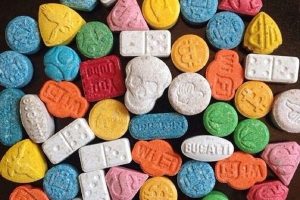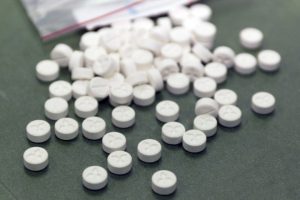
Will I Experience Withdrawal From Molly?
Molly, otherwise known as ecstasy or MDMA, is a popular party drug. It is both a stimulant and a hallucinogen. If you take it, the drug increases your levels of pleasure, warmth, energy, and even your closeness to others. While molly gives such euphoric effects, it also messes with your senses.
Eventually, taking molly constantly for a long time will lead to addiction. At this stage, you will become dependent on molly to function. You won’t be able to live normally without the drug anymore.
What does molly do to my brain?
 Molly is a psychoactive drug. That means it affects your brain in a variety of ways. Its most prominent effect is giving you euphoric highs, which are intensely pleasurable. Each time you take the drug, you get these highs, and soon enough, you will want to have those feelings every single time.
Molly is a psychoactive drug. That means it affects your brain in a variety of ways. Its most prominent effect is giving you euphoric highs, which are intensely pleasurable. Each time you take the drug, you get these highs, and soon enough, you will want to have those feelings every single time.
When you keep taking molly, your brain will soon become dependent on the drug. You will crave those euphoric feelings more and more. With that, taking the drug will become part and parcel of your daily routine. You can no longer function properly without it.
Pretty soon, you will develop an addiction to molly.
What if I tried to quit taking molly?
If you decide to quit, it will be a challenge. You will experience withdrawal symptoms, which can be unpleasant. This happens because your brain is trying hard to adjust to the drug’s absence.
Most of the time, these symptoms could be so strong and uncomfortable. Because of that, they could drive you to take molly again just to get some relief.
What are these withdrawal symptoms?
Molly withdrawal symptoms include the following:
- Confusion
- Anxiety
- Depression
- Agitation
- Paranoia
- Insomnia
- Depression
- Fatigue
- Trouble concentrating on tasks
- Problems with memory
- Loss of appetite
- Changes in how you perceive yourself
 These symptoms are not life-threatening. However, they do produce a lot of physical and mental discomfort. This is what makes quitting particularly hard. The unpleasant nature of the withdrawal symptoms often forces you to take more molly for them to go away.
These symptoms are not life-threatening. However, they do produce a lot of physical and mental discomfort. This is what makes quitting particularly hard. The unpleasant nature of the withdrawal symptoms often forces you to take more molly for them to go away.
The symptoms experienced will vary for different people. You may have only some of the things mentioned above, while others may have more of them. It depends on how much molly you’ve taken, how long you’ve been using the drug, and how often you take it.
In other cases, molly is cut with other drugs like ketamine, heroin, amphetamines, and others. Also, some users take it in tandem with other illegal drugs, such as cocaine, LSD, or marijuana. When molly is combined with these drugs, the withdrawal symptoms can be more varied and intense.
What are the consequences of molly withdrawal?
When experiencing molly’s withdrawal symptoms, you are very prone to relapse. This is when you try quitting the drug, but you end up taking it again.
Relapse during the withdrawal stage is particularly dangerous. At this point, your tolerance to molly has dropped. So, if you take the same amount of the drug as before, your risk of overdose is higher.
If you overdose on molly, the effects can be fatal.
What will happen if I overdose on molly?
Molly overdose can pose a serious threat to your life. Here are the signs to watch out for:
- Vomiting and seizures
- Dizziness and confusion
- Muscle cramps or twitching
- Heart palpitations
- Sudden increase in blood pressure and body temperature
If overdose is not addressed immediately, it may lead to these life-threatening situations:
- Stroke
- Cardiac arrest
- Kidney failure
- Dehydration and hyperthermia (body overheating)
- Dilutional hyponatremia (water intoxication)
When you or someone close to you experiences these overdose symptoms, call 911 right away. Do not wait; the sooner medical help comes, the better the chances of survival.
How do I deal with these withdrawal symptoms?
Molly withdrawal symptoms are difficult to manage on your own, especially when you get into depression. This is why quitting by yourself is not recommended.
The best thing to do is to go to a facility where you can go through medically-assisted detox. There, doctors will help you manage the withdrawal symptoms as you take progressively lower doses of molly. After a number of days, you can go by without taking any drug at all.
During the detox process, you may be given medications. These will help ease the discomfort you experience when withdrawal kicks in. That way, you can avoid relapsing while you go through detox.
Also, you can get help at any time during the detox process. Care is available 24/7, so if you encounter any problems, you can call for help and medical professionals will assist you right away.
What medications will I be prescribed during molly detox?
 The medications will depend on the withdrawal symptoms that show up. For instance, if you experience feelings of depression, doctors will give you antidepressants. If you develop insomnia, you will be given sleeping pills.
The medications will depend on the withdrawal symptoms that show up. For instance, if you experience feelings of depression, doctors will give you antidepressants. If you develop insomnia, you will be given sleeping pills.
If you have been using molly for a really long time, you could suffer from poor appetite, anorexia, and weight loss. This will also be addressed during medical detox through healthy, balanced meals. Doctors will provide you carefully selected food items to restore your body to good health.
If you experience dehydration, doctors will give you extra fluids as well during detox.
With these treatments, you can go through detox as comfortably as possible. Once the process is over, you can then go through daily life without having to take molly.
Will I be cleared of my molly addiction after detox?
Detox is only the first step of a full rehab program. The next steps to overcoming your molly addiction consist of behavioral therapies, which deal with the mental aspects affected by the addiction. These may include:
- Cognitive behavioral therapy
- Motivation enhancement therapy
- Family / couples therapy
- Support groups
During therapy sessions, you will work hand-in-hand with a therapist to reframe your state of mind. This process will take time, but in the end, you will be able to live a normal, sober life once again.